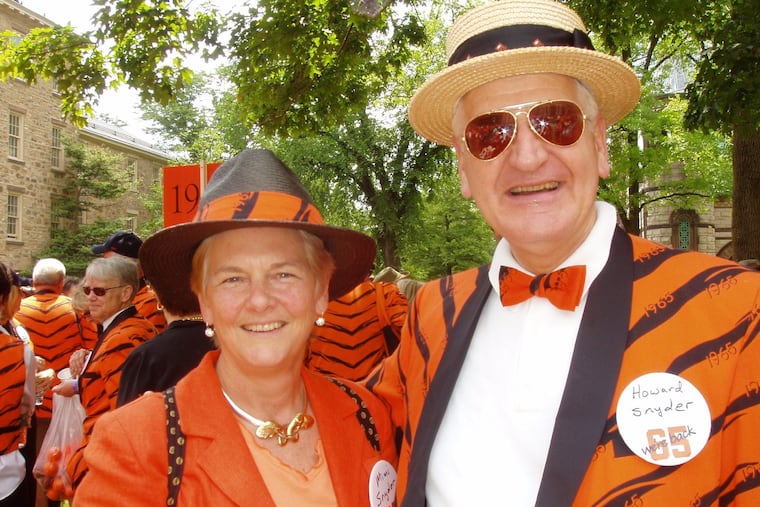Howard Snyder III, 76, was a trailblazing CHOP doctor and plane crash survivor
As a child, he dined and played at the White House during the Eisenhower years. Then he spent a lifetime helping some of the most vulnerable patients lead better lives.

- Howard Snyder III
- 76 years old
- Lived in Haverford
- He was a pioneer in pediatric urology and plane crash survivor
When summing up a life as remarkable as that of Howard Snyder III, the biggest decision is where to start.
He was a pioneer in pediatric urology, a specialty that barely existed when he was hired by Children’s Hospital of Philadelphia in 1980.
He shared Thanksgiving dinner at the White House as a child with President Dwight D. Eisenhower, and splashed alongside former British Prime Minister Harold Macmillan in the West Wing’s old swimming pool.
He lectured all over the world, raised a family in Haverford, and touched scores of others either as colleagues or patients.
» VIDEO: Dr. Snyder on 60 Minutes discussing the dangers of plastics on pregnant women
There was almost nothing that could stop Dr. Snyder’s dedication to humanity. Not even a plane crash.
“I can’t tell you how many people have written me and said what an effect he had on their lives and the direction that their careers took,” said Mimi, his wife of 46 years. “He also had lifelong friends that he kept in touch with. I took over writing Christmas cards years ago, and I write cards for people I never even met.”
Dr. Snyder, 76, died of complications from COVID-19 on Thursday, June 4, at the Beaumont retirement community in Bryn Mawr.
Dr. Snyder traveled the world to advance pediatric urology, the idea being to treat children before their problems magnified as they became adults. By his wife’s count, Dr. Snyder went nine times to India and six to Turkey. He went to China, Europe, South America, and many stops in between. As one colleague said, “He’s been everywhere except Antarctica.”
But his life nearly ended before any of this began.
Dr. Snyder had just turned 21 and was part of a contingent of Princeton University students helping to provide immunizations and education in South America. On Aug. 31, 1964, the group’s twin-engine DC-3 crashed in the jungles of Ecuador.
“Howie recounted that the plane was shaking violently, and people were screaming, and that he thought he was going to die,” said Tom Snyder, his younger brother by three years. Tom Snyder said the plane bounced for several hundred yards before breaking apart, killing 10 passengers.
» READ MORE: Dr. Howard Snyder III receives prestigious award
Perhaps that brush with death ignited a flame of compassion in Dr. Snyder. His daughter, Emily, a family physician who lives two hours north of Toronto, recalled a story from 25 years ago.
“He had a child with a new diagnosis of a Wilms’ tumor, which is a cancer of the kidney,” she said. “My dad wanted to remove it before Christmas. I don’t remember if it was Dec. 23 or 24, but he wanted to be able to tell this family that the cancer was out before Christmas. He knew that would be meaningful for the family. It was amazing. That always stuck with me.”
“You can imagine how tiny the plumbing system of a neonatal is. It’s really microsurgery. He helped define pediatric urology as a specialty. He wanted to give these children the best possible lives they can have."
Dr. Snyder was born in Carlisle, Pa. His grandfather was Eisenhower’s personal physician for 25 years, which enabled the family to spend occasional holidays at the White House. Tom Snyder said he figures their grandfather had to be near when Eisenhower made the decision to invade Normandy on D-Day.
Dr. Snyder attended St. Andrew’s School in Delaware, Princeton, and Harvard Medical School. He did his training in Boston, where he met his wife, and England before joining John Duckett as the only two urologists on the CHOP staff. Dr. Snyder, who was honored with an endowed chair in his name, retired in 2015.
He also served extensively in the Army and could have become a general, like his father and grandfather, if not for his commitment to CHOP. He retired as a colonel.
Daughter Emily was able to help with his care toward the end of his life at Beaumont. After her father was buried, she wanted to say goodbye in her own way. So she got some blueberry pancakes from an IHOP restaurant, rekindling a childhood memory, and had one last breakfast with her dad.
“He valued life, and was still curious about the world,” she said. “He wanted to listen to audio books. He asked nurses to let him listen in to radiology rounds. He wanted to stay engaged. … I don’t know what my end of life will be like, but I hope that I can go in such a dignified way as he did. It was his last life challenge, and it was amazing how he approached it.”
In addition to his wife, daughter, and brother, Dr. Snyder is survived by sons Curtis and Jonathan, and 10 grandchildren.
— Ed Barkowitz, ebarkowitz@inquirer.com